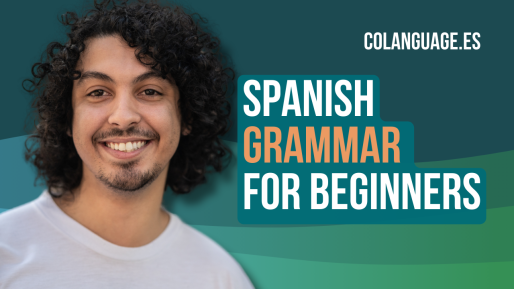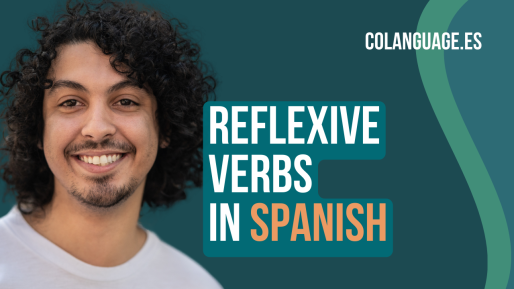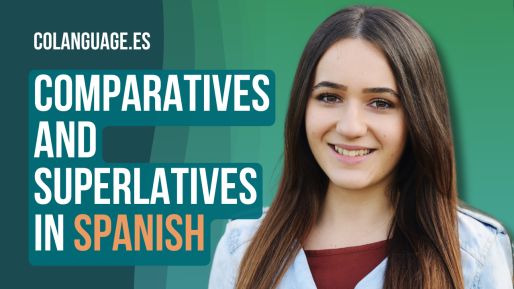Spanish present subjunctive: conjugation and examples Share Copied!
Spanish
In this lesson, we are going to learn about the present subjunctive in Spanish.
Video
Podcast
What is the present subjunctive?
The subjunctive mood in Spanish is used to talk about things that are uncertain, imagined, or not yet real. It has several tenses, the most common are the present and the imperfect. Here, we focus on the present subjuntive.
-
Si yo fuera tú, iría. (If I were you, I would go.)
-
Ojalá estuvieras aquí. (I wish you were here.)
When to use the present subjunctive in Spanish
The present subjunctive is used to express wishes, emotions, uncertainty, doubt, and after certan conjunctions, such as "que" or "cuando". In sentences containing two verbs with different subjects, the second verb is in the subjunctive when the first verb expresses a wish or an emotion.
| Use cases | Spanish | English |
|---|---|---|
| To express wish or emotion | Quiero que vengáis a la fiesta. | I want you to come to the party. |
| Espero que haga buen tiempo. | I hope the weather will be good. | |
| To express doubt or uncetainty | Dudo que llegues a tiempo. | I doubt you will arrive on time. |
| No creo que vengan. | I don't think they will come. | |
| After certain conjunctions | Salimos sin que nos vieran. | We left without them seeing us. |
| Llama cuando termines de cenar. | Call when you finish dinner. |
In the subjunctive form, the subject pronoun is not always necessary since the verb form already indicates the subject.
¿Hace falta que tú vayas? ¿Hace falta que vayas? (Do you need to go?)
Listening exercise
This dialogue demonstrates the use of the present subjunctive in Spanish.
| Spanish | English | |
|---|---|---|
| Daniel | ¿Quieres que vaya contigo al cine esta noche? | Do you want me to go with you to the movies tonight? |
| María | Prefiero que pases tiempo con tu familia. | I prefer you to spend time with your family. |
| Daniel | Pero es importante que veas esta película. | But it's important that you see this movie. |
| María | Sí, pero prefiero que la veamos juntos otro día. | Yes, but I prefer us to watch it together another day. |
The present subjunctive: verbs ending in "-ar"
The present subjunctive for verbs in “-ar” have endings starting with “-e”, which can seem counterintuitive.
Conjugation of "hablar" in Spanish
The following table shows the full conjugation of the verb "hablar" (to speak/to talk) in the present subjunctive.
| Personal pronoun | Spanish | English |
|---|---|---|
| Yo (I) | Es importante que yo hable con él. | It's important that I speak with him. |
| Tú (You) | Quiero que tú hables más despacio. | I want you to speak more slowly. |
| Él/Ella (He/She/It) | Espero que él hable con la verdad. | I hope he speaks the truth. |
| Nosotros/-as (We) | El profesor quiere que nosotros hablemos en español. | The teacher wants us to speak in Spanish. |
| Vosotros/-as (You) | Es necesario que vosotros habléis con claridad. | It's necessary that you speak clearly. |
| Ellos/-as (They) | Dudo que ellos hablen inglés. | I doubt they speak English. |
The endings -e, -es, -e, -emos, -éis, -en are attatched to the verbs ending in -ar.
hablar habl -e/-es/-e/-emos/-éis/-en
Listening exercise
This dialogue uses verbs ending in "-ar" that are conjugated in the present subjunctive.
| Spanish | English | |
|---|---|---|
| Daniel | ¿Hablas con tu amigo sobre el viaje que estáis planeando? | Are you talking to your friend about the trip you're planning? |
| María | Sí, pero preferiría que no hablemos de eso ahora. | Yes, but I'd prefer that we don't talk about it now. |
| Daniel | ¿Por qué no quieres que hablemos de eso? | Why don't you want us to talk about it? |
| María | Porque creo que es importante que estudie para mis exámenes. | Because I think it's important that I study for my exams. |
| Daniel | Si quieres que te ayude, no dudes en decírmelo. | If you want me to help you, don't hesitate to tell me. |
Present subjunctive: verbs ending in "-er" and "-ir"
The conjugation of regular verbs ending in "-er" and "-ir" are the same, and they always start with an "-a".
Conjugation of "comer" in Spanish
Below you can see the conjugation in the present subjunctive of the regular verb "comer" (to eat).
| Personal pronoun | Spanish | English |
|---|---|---|
| Yo (I) | Espera que yo coma saludablemente. | She hopes that I eat healthily. |
| Tú (You) | Es necesario que comas más frutas. | It is necessary that you eat more fruits. |
| Él/Ella (He/She/It) | Quiero que coma temprano. | I want him to eat early. |
| Nosotros/-as (We) | Mi mamá insiste en que nosotros comamos juntos en familia. | My mom insists that we eat together as a family. |
| Vosotros/-as (You) | Sugiero que vosotros comáis en el restaurante italiano. | I suggest you eat at the Italian restaurant. |
| Ellos/-as (They) | No creo que ellas coman carne. | I don't think they eat meat. |
The endings -a, -as, -a, -amos, -áis, -an are attatched to the verbs ending in -er and -ir.
comer com -a/-as/-a/-amos/-áis/-an
Conjugation of "vivir" in Spanish
The following table contains the conjugation of the verb "vivir" (to live) in the present subjunctive.
| Personal pronoun | Spanish | English |
|---|---|---|
| Yo (I) | Espera que viva en una casa grande algún día. | He hopes I live in a big house someday. |
| Tú (You) | No es seguro que tú vivas aquí para siempre. | It's not certain that you will live here forever. |
| Él/Ella (He/She/It) | Me alegra que ella viva cerca de mí. | I'm glad she lives close to me. |
| Nosotros/-as (We) | Espero que nosotros vivamos en paz. | I hope that we live in peace. |
| Vosotros/-as (You) | Es importante que vosotros viváis una vida plena. | It is important that you live a full life. |
| Ellos/-as (They) | Quiero que ellos vivan felices. | I want them to live happily. |
Listening exercise
This short dialogue contains verbs ending in "-er" and "-ir", conjugated in the present subjunctive.
| Spanish | English | |
|---|---|---|
| Daniel | Espero que vivas cerca de aquí para que podamos vernos más seguido. | I hope you live nearby so that we can see each other more often. |
| María | Sí, espero que vivamos cerca para vernos más. | Yes, I hope we will live nearby to see each other more. |
| Daniel | ¡Ojalá que comas sano y te cuides mucho! | I hope you eat healthy and take care of yourself a lot! |
| María | Sí, es fundamental que coma bien para mantenerme saludable. | Yes, it's essential that I eat well to stay healthy. |
Spanish present subjunctive: irregular verbs
The present tense conjugation of the subjunctive mood is different for irregular verbs. They do not follow any patterns.
| Infinitive form | Spanish | English |
|---|---|---|
| Caber (To fit) | Espero que quepa en el coche. | I hope I fit in the car. |
| Estar (To be) | Es importante que tú estés tranquilo antes del examen. | It's important that you are calm before the exam. |
| Dar (To give) | Espero que él dé un buen regalo a su madre por su cumpleaños. | I hope he gives a good present to his mother for her birthday. |
| Ser (To be) | Es necesario que seamos puntuales para la reunión. | It's necessary that we are punctual for the meeting. |
| Saber (To know) | No creo que vosotras sepáis la respuesta correcta. | I don't think you know the correct answer. |
| Ir (To go) | Dudo que ellos vayan a la fiesta esta noche. | I doubt they will go to the party tonight. |
Irregular verbs do not follow any patterns.
Listening exercise
In the following, the present subjunctive of irregular verbs is demonstrated in a dialogue.
| Spanish | English | |
|---|---|---|
| Daniel | Espero que tú des tu opinión en la reunión de hoy. | I hope you give your opinion in today's meeting. |
| María | Sí, es importante que sea honesta y clara en mis comentarios. | Yes, it's important that I am honest and clear in my comments. |
| Daniel | Además, es fundamental que tú estés presente durante toda la sesión. | Furthermore, it's crucial that you are present throughout the session. |
| María | Espero que todo vaya bien. | I hope everything goes well. |
Key takeaways
Here is a quick summary of this lesson.
- The subjunctive mood in Spanish is used to express necessity, possibility, doubt, desire, or uncertainty.
- The endings -e, -es, -e, -emos, -éis, -en are attatched to the verbs ending in -ar.
- The endings -a, -as, -a, -amos, -áis, -an are attatched to the verbs ending in -er and -ir.
Subscribe to our social media channels to get free daily exercises!



